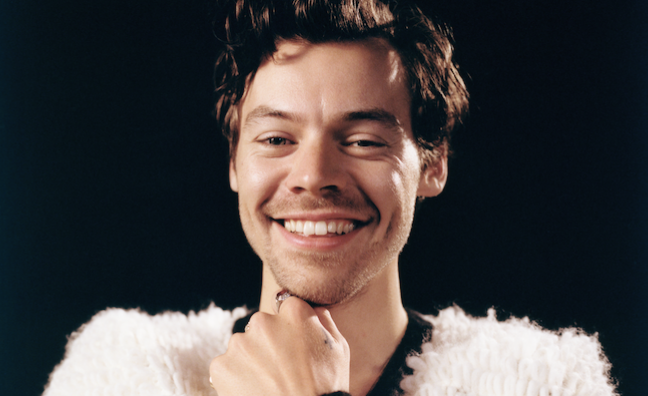Welcome to Harry’s House, a place where all is not quite as it seems. That much is clear from the album cover alone. On it, Harry Styles stands, in what looks like a living room, one hand resting on his chin and the other on his hip, with a faraway look in his eyes. A ceiling lamp hangs upwards by his feet, defying gravity, furniture is suspended above his head.
Released this week via Columbia, the third Harry Styles solo album begins with a pristine thwack of drums, blasts of brass and emphatic harmonies. It’s an instantaneous hit of pure joy, but once the verses of opener Music For A Sushi Restaurant kick in, things start to get weird. ‘Green eyes, fried rice/I could cook an egg on you’, goes Styles, delivering the first line of the most anticipated pop album of the year as if singing only to himself, his voice pitched high. The vocals and the music take the lead in turn, Styles willing us to follow the giant, wobbling bassline as much as his lyrics. There’s no conventional chorus here, merely the title murmured repeatedly, but when he sings, ‘It’s ‘cause I love you babe/In every kind of way/Just a little taste’, the shackles are released. As it noodles towards a conclusion, we enter jazz territory, the barbershop harmonies giving way to, ‘Scuba duba dubub boo’, with Styles considering the possibility of eating the stars in the sky, just to taste them.
It’s a curious, shape-shifting beginning, setting a tone that permeates the 12 tracks that follow. Styles has said that he conceived this all-important third record to be fun to make and entirely his, a place where he can express himself as he pleases, unfiltered and unadulterated. Pure Harry, in other words.
Recorded between LA and the UK, plus one session in Tokyo, where Styles and long-term collaborator Kid Harpoon have spent time together, the album features broadly the same cast as Fine Line. Styles’ core team of Harpoon and Tyler Johnson is supplemented by previous collaborators Mitch Rowland, Amy Allen and Sammy Witte. Daydreaming also credits LA funk group The Brothers Johnson, thanks to its sample of Ain't We Funkin' Now.

And the music feels liberated, alive. If the sun-scorched and ludicrously successful Fine Line (598,999 sales, according to the Official Charts Company) plumped up the ideas expressed on his 2017 debut album, Harry’s House goes further still, delivering a vivid portrait of its maker. What emerges is a picture of an artist intent on discovering new ways to write about the things we all feel and warping perceptions of what pop music can be. All the things that made Watermelon Sugar (1,822,334 sales) his biggest song so far are abundant on Harry’s House, edges sharpened, wilful weirdness upscaled. Cinema is its most obvious successor, mixing some typical Styles heart-on-sleeveness with another quaking bassline, disco guitars and a chorus that seems to overlap itself. Lyrics often assume a stream of consciousness feel, stitching together food (lots of food), objects, experiences, innuendo to make a point (‘Wine glass/Puff pass/Tea with cyborgs’, goes the brilliant Keep Driving).
Late Night Talking is a super-chilled love song about wanting to make someone happy, but veiled beneath its easy groove is a chorus perfectly suited to incessant radio play. As It Was, the introspective lead single with which Styles broke One Direction’s record for consecutive weeks at the top of the UK singles chart, is genius because it’s a hit every bit as obvious as, say, The Weeknd’s Blinding Lights, only with none of the blatant pop bombast. Like much of Harry’s House, it feels like a single by a particularly emotional indie band. Its obvious companion on the album is Satellite, which billows into life after a quiet intro, careening synths eventually doused in heavy guitars and drums.
Styles indulges an inner rock god on Daylight, too, contrasting the record’s most saccharine lyrics ('If I was a bluebird, I would fly to you/You’d be the spoon/Dip you in honey so I could be sticking to you’) with noisy dirge, which comes as a genuine surprise.
Even the more restrained moments prickle with a sense of newness. The album takes its name from Joni Mitchell’s Harry’s House/Centrepiece (from her 1975 album The Hissing Of Summer Lawns) and Styles’ love of folk rock is well documented, but his experiments with acoustic guitars are more adventurous here. Little Freak and Matilda meander slowly, making for a hushed middle section of the album, Styles pushing his voice to its extremes over unvarnished acoustic and piano on the latter. Boyfriends, debuted at Coachella back in April, offers up harmonies and slide guitar, as Styles admonishes male failings in relationships with help from co-writer Tobias Jesso Jr, whose credits include Adele’s When We Were Young.
That single, incidentally, has 1,674,597 UK sales, and while it remains to be seen whether anything on Harry’s House will scale such heights, it would surely be inadvisable to suggest otherwise. As It Was (Styles' ninth single to go gold in the UK) is already on its way towards the half a million mark.
But this album arrives with the weight of an unstoppable force behind it. Harry Styles is growing as a musician with every release and the sense is that he’ll bend pop’s landscape to his will, rather than fit into it. Forget Harry’s House, we're in Harry’s world now.
Revisit our 2019 cover interview with Harry Styles here.
PHOTO: Lillie Eiger









